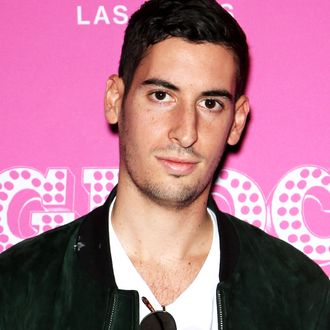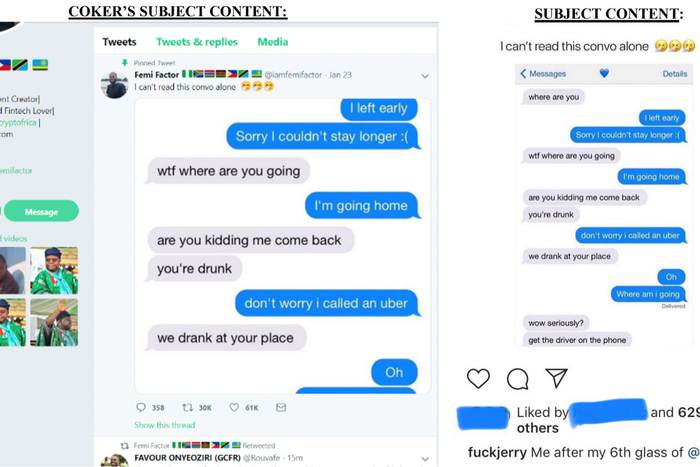
Almost two months after the wildly popular Instagram meme account FuckJerry received backlash from comedians and artists for posting other peopleÔÇÖs work without credit or compensation, one Twitter user has decided to take his case to court. This week, a complaint was filed in the Southern District of New York on behalf of Nigerian-based Twitter user and Instagrammer Olorunfemi Coker, who has 133,000 followers on Twitter and over 62,000 followers on Instagram. The lawsuit alleges that FuckJerry posted a screenshot of a January tweet by Coker to its Instagram account without CokerÔÇÖs permission and used it to advertise its JAJA tequila brand. (The post no longer appears to be on the FuckJerry Instagram page.) According to CokerÔÇÖs lawyer Scott Burroughs, this is the first case of its kind brought against FuckJerry.
The complaint, filed yesterday, alleges several violations by FuckJerry, including copyright infringement and using CokerÔÇÖs name to promote JAJA and Jerry Media without written consent. The complaint also alleges that Coker sent messages to FuckJerry about the post but did not receive a response. Burroughs says his firm, Doniger/Burroughs, has ÔÇ£a number of clients with claimsÔÇØ against FuckJerry, but CokerÔÇÖs complaint is the first to be filed in court. He notes that similar lawsuits have been filed before, including cases where brands posted photographs to social media without photographersÔÇÖ permission, that have set a precedent for how copyrightable material can be treated by companies on social media. Here are the screen grabs included in the complaint, showing both CokerÔÇÖs original tweet as well as the FuckJerry ad:
According to Burroughs, one way the FuckJerry lawsuit differs from, say, Alex KasebergÔÇÖs lawsuit against Conan OÔÇÖBrienÔÇÖs show accusing its writers of joke theft, is a doctrine called ÔÇ£idea-expression dichotomy.ÔÇØ In the case of the Conan lawsuit, the complaint hinges on jokes that are very similar but not identical, while in the case of FuckJerry, it involves copying someone elseÔÇÖs content directly without consent. Burroughs says idea-expression dichotomy means, generally speaking, that ÔÇ£ideas are free for anyone to use ÔÇö so you canÔÇÖt copyright an idea. You can, though, copyright the expression of a particular idea.ÔÇØ This presumably makes cases like KasebergÔÇÖs a little more complicated compared to ones with FuckJerry, where an argument canÔÇÖt be made that the content was a coincidence or parallel thinking.
When asked about the other tweets FuckJerry posted without permission that didnÔÇÖt include captions advertising their products, Burroughs argues that theyÔÇÖre still essentially ads. In those cases, the content creators ÔÇ£are still being exploited in a commercial context, because their material is being used to grow the base, grow the users, grow the clicks, grow the engagement, and that engagement provides the entirety of the valuation for FJerryÔÇÖs brand,ÔÇØ he says. ÔÇ£So even if itÔÇÖs not coupled directly with an advertisement, itÔÇÖs still an advertisement for the brand itself. And it still draws revenues, because it allows the brand to sell advertisements for third-party products and services and otherwise monetize the account.ÔÇØ
It will be interesting to see what happens next in this lawsuit or any others that are filed against FuckJerry, but as the ongoing legal dispute between Alex Kaseberg and Conan OÔÇÖBrien shows (that trial starts in May), it will likely be a long time until thereÔÇÖs a ruling. In the meantime, Burroughs argues that the DMCA takedown procedure provides a ÔÇ£safe harborÔÇØ for platforms like Instagram (Burroughs says Coker did not file a DMCA takedown request, but messaged FuckJerry about the post). He also argues that the current written law is ÔÇ£hopelessly out-of-dateÔÇØ and largely favors tech platforms like Instagram, and that the Copyright Act ÔÇ£needs to be revised to reflect the power of these tech companies in the marketplace and the relative lack of power for the creators.ÔÇØ
FuckJerry did not respond to VultureÔÇÖs request for comment but they did respond to BuzzFeed News, saying the lawsuit is ÔÇ£frivolousÔÇØ and ÔÇ£we intend to defend it vigorously.ÔÇØ
Update, March 22: According to court documents, CokerÔÇÖs lawyer filed a notice of voluntary dismissal yesterday. Elliot Tebele, Jerry Media, and JAJA also released a statement today, in which Jerry MediaÔÇÖs counsel, Jason P.W. Halperin, commented on the case. ÔÇ£We are pleased to see that this lawsuit has been dismissed ÔÇö only two days after it was filed. Our own investigation has revealed that Mr. Coker was almost certainly not the original creator of the Subject Content described in the Complaint and thus he had no standing to bring such a suit at all,ÔÇØ Halperin said. ÔÇ£Our clients are now considering taking their own legal actions, including for defamation, against the responsible parties.ÔÇØ
The statement goes on to note that CokerÔÇÖs complaint was filed after FuckJerry moved ÔÇ£to a fully consent-based model where it would obtain consent from all content creators to use their material and give them full credit for such content. Jerry Media has implemented and followed this policy for all of its online platforms.ÔÇØ The company says that ÔÇ£[i]f and when there are any future lawsuits,ÔÇØ it plans to ÔÇ£defend itself vigorously.ÔÇØ
CokerÔÇÖs lawyer has not yet commented on the dismissal, but weÔÇÖll update this post if he does.



